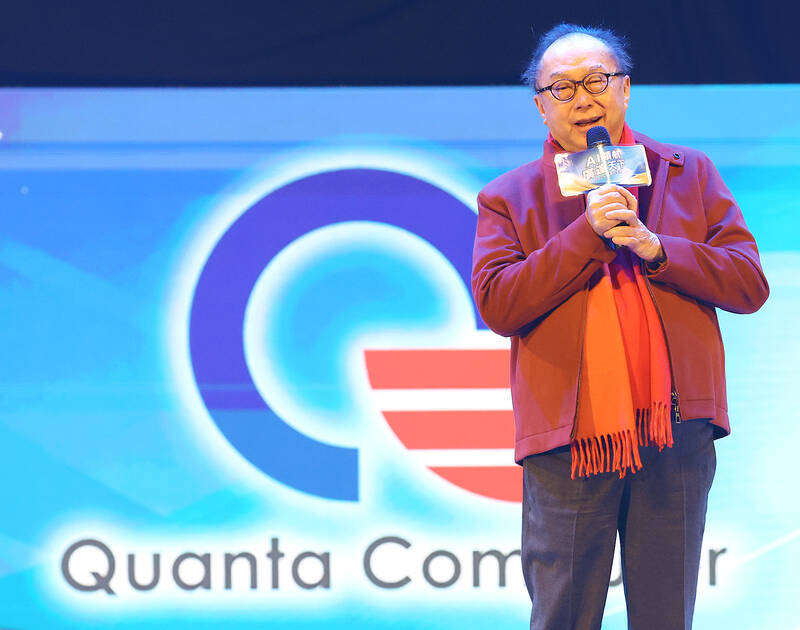Ninety-six percent of companies in Taiwan plan to issue Lunar New Year or year-end bonuses, with the average being 1.39 months of wages, the highest average since 2012 amid improving corporate profitability, 1111 Job Bank (1111人力銀行) said yesterday, citing a survey.
The number of firms offering bonuses is up 10 percent from a year earlier, when the average was 1.32 months of wages, 1111 Job Bank said.
Financial institutes topped the survey, with the average bonus in the sector amounting to 1.97 months of wages, it said, adding that local life insurers, lenders, asset management firms and securities brokerages benefited from rising demand for wealth management, and stock rallies at home and abroad.

Photo: CNA
The average year-end bonuses at the most profitable financial institute, Fubon Financial Holding Co (富邦金控), are to be 7.5 months of wages, up from six months last year, Fubon Financial Holding chairman Richard Tsai (蔡明興) told reporters on the sidelines of a year-end banquet.
State-run Hua Nan Financial Holding Co (華南金控) said that its employees were expected to benefit from the bank-focused conglomerate’s profit growth by receiving bonuses of 6.5 to seven months of wages.
The nation’s 14 listed financial holding companies reported combined profits of NT$571.4 billion (US$17.36 billion) in the first 11 months of last year, giving them room to be generous, 1111 Job Bank said, adding out that year-end bonuses have become part of total compensation packages to attract and retain talent.
Taiwanese suppliers of IT products were second with average bonuses in the sector of 1.6 months of wages, the survey showed.
The IT industry was a major beneficiary of the artificial intelligence boom, the job bank said, adding that 76 percent of companies in the sector planned to raise wages this year.
Barry Lam (林百里), founder and chairman of AI server provider Quanta Computer Inc (廣達), told employees on Thursday that the company would undergo rapid business growth this year on top of strong earnings last year.
The transportation and logistics industry was third, with bonuses of 1.5 months of wages, the survey showed.
Employees at Evergreen Marine Corp (長榮海運), Taiwan’s largest cargo container shipping company, reportedly received 20 months of wages as year-end bonuses this week, as the shipping industry benefited from disruptions to container shipping traffic in the Red Sea last year.
Companies that do not plan to issue bonuses pinned the blame mainly on disappointing financial results, the job bank said.
The survey showed that 71.3 percent of firms would take employees’ performance and seniority into consideration when arriving at bonus amounts, while a few companies limit bonuses to employees who outperform their peers, the job bank said.

Taiwan Semiconductor Manufacturing Co (TSMC, 台積電) last week recorded an increase in the number of shareholders to the highest in almost eight months, despite its share price falling 3.38 percent from the previous week, Taiwan Stock Exchange data released on Saturday showed. As of Friday, TSMC had 1.88 million shareholders, the most since the week of April 25 and an increase of 31,870 from the previous week, the data showed. The number of shareholders jumped despite a drop of NT$50 (US$1.59), or 3.38 percent, in TSMC’s share price from a week earlier to NT$1,430, as investors took profits from their earlier gains

In a high-security Shenzhen laboratory, Chinese scientists have built what Washington has spent years trying to prevent: a prototype of a machine capable of producing the cutting-edge semiconductor chips that power artificial intelligence (AI), smartphones and weapons central to Western military dominance, Reuters has learned. Completed early this year and undergoing testing, the prototype fills nearly an entire factory floor. It was built by a team of former engineers from Dutch semiconductor giant ASML who reverse-engineered the company’s extreme ultraviolet lithography (EUV) machines, according to two people with knowledge of the project. EUV machines sit at the heart of a technological Cold

AI TALENT: No financial details were released about the deal, in which top Groq executives, including its CEO, would join Nvidia to help advance the technology Nvidia Corp has agreed to a licensing deal with artificial intelligence (AI) start-up Groq, furthering its investments in companies connected to the AI boom and gaining the right to add a new type of technology to its products. The world’s largest publicly traded company has paid for the right to use Groq’s technology and is to integrate its chip design into future products. Some of the start-up’s executives are leaving to join Nvidia to help with that effort, the companies said. Groq would continue as an independent company with a new chief executive, it said on Wednesday in a post on its Web

CHINA RIVAL: The chips are positioned to compete with Nvidia’s Hopper and Blackwell products and would enable clusters connecting more than 100,000 chips Moore Threads Technology Co (摩爾線程) introduced a new generation of chips aimed at reducing artificial intelligence (AI) developers’ dependence on Nvidia Corp’s hardware, just weeks after pulling off one of the most successful Chinese initial public offerings (IPOs) in years. “These products will significantly enhance world-class computing speed and capabilities that all developers aspire to,” Moore Threads CEO Zhang Jianzhong (張建中), a former Nvidia executive, said on Saturday at a company event in Beijing. “We hope they can meet the needs of more developers in China so that you no longer need to wait for advanced foreign products.” Chinese chipmakers are in